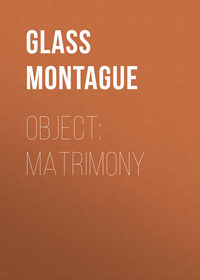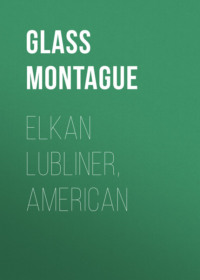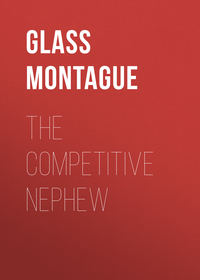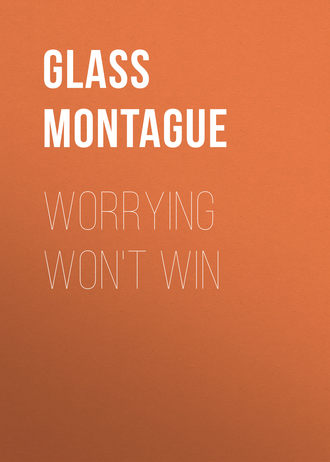 полная версия
полная версияWorrying Won't Win
"I know it," Abe agreed. "You see, Mawruss, an editor, a soap-boxer, a cotton-mill owner, or a stock-waterer might get away with it in this country under the Constitution, but over on the other side they wouldn't know what he was talking about at all, because in Germany, Mawruss, a constitution means only one thing. It's something that can be ruined by drinking too much beer, and you don't have to hire no lawyer for that."
III
POTASH AND PERLMUTTER ON FINANCING THE WAR
On everything which a feller buys, from pinochle decks to headache medicine, he will have to put a stamp.
"I see where this here Chump Clark says that incomes from over ten thousand dollars should ought to be confiscated," Abe Potash observed to his partner, Morris Perlmutter, one morning in September.
"Sure, I know," Morris replied, "and if this here Chump Clark has a good year next year and cleans up for a net profit of ten thousand two hundred and twenty-six dollars and thirty-five cents, then he'll claim that all incomes over ten thousand two hundred and twenty-six dollars and thirty-five cents should ought to be confiscated, Abe, and that's the way it goes. I am the same way, Abe. Any one what makes more money as I do, Abe, I 'ain't got no sympathy for at all."
"I bet yer Vincent Astor thinks that John B. Rockafellar should ought to be satisfied mit the reasonable income which a feller could make it by working hard at the real-estate business the way Vincent Astor does," Abe commented.
"John B. Rockafellar oser worries his head over the ravings of a protelariat," Morris said. "But, anyhow, Abe, there's a whole lot to what this here Chump Clark says at that. If we compel men to give up their lives for their country, why shouldn't we compel them fellers which has got incomes of over ten thousand dollars to give up their property for their country also?"
"Well, I'll tell you, Mawruss," Abe replied. "This here Chump Clark is a Congressman, and the way I feel about it is, that when a Congressman wants to say something in Congress, y'understand, he should ought to be compelled to first submit it in writing to a certified public accountant or, anyhow, a bookkeeper, y'understand, because the average Congressman 'ain't got no head for figures. Take Mr. Clark, for example, and when he reckons that everybody which gets drafted is going to give up his life for his country, y'understand, you don't got to be the head actuary of the Equitable exactly in order to figure it out that he's made a tremendous overestimate. So when the same feller talks about confiscating incomes over ten thousand, it ain't necessary to ask how he come to fix on ten thousand instead of five thousand or fifteen thousand, because whether he tossed for it or dealt himself three cold hands, and the hand representing ten thousand dollars won out with treys full of deuces, y'understand, the information ain't going to help us finance the war to any extent."
"Why not?" Morris asked.
"Because you take yourself, for instance, and we would say for the sake of argument that in nineteen seventeen you turned over a new leaf and worked so hard that you made fifteen thousand five hundred dollars."
"Listen, Abe," Morris interrupted, "if there is a new leaf coming to any one around here, Abe, I wouldn't mention no names for the sake of an argument or otherwise."
"All right," Abe said, "then we'll say you didn't work no harder, but just the same, Mawruss, if you was to make fifteen thousand five hundred dollars in nineteen seventeen, and this here Chump Clark gets the government to confiscate fifty-five hundred dollars on you, how much would they confiscate on you in nineteen eighteen?"
Morris shrugged his shoulders. "What is the use of talking pipe dreams?" he said.
"I ain't talking pipe dreams," Abe retorted. "This is something which not only Chump Clark suggested it, but Senator LaFollette also as a good scheme for financing the war."
"Evidently they don't expect the war to last long," Morris commented, "which the most the government could hope to collect is the excess income for nineteen seventeen, because if the government confiscates five thousand five hundred dollars on me in nineteen seventeen, am I going to go around in the summer of nineteen eighteen beefing about business being rotten because here it is the first of July, nineteen eighteen, and so far all the government could confiscate on me is two thousand two hundred and sixty-seven dollars and thirty-eight cents, whereas on July first, nineteen seventeen, I had already got confiscated on me two thousand four hundred and thirty-one dollars and fifty cents? Oser a Stück! If I have made ten thousand dollars as early as April first, nineteen eighteen, and I know that all further profits for nineteen eighteen is going to be confiscated by the government, y'understand, right then and there I am going to shut up shop and paste a notice on the door:

and anybody else would do the same, Abe, I don't care if he would be as patriotic as Senator LaFollette himself even."
"But that ain't the only idees for financing the war which Congress has got it, Mawruss," Abe said. "On everything which a feller buys, from pinochle decks to headache medicine, he will have to put a stamp. There will be extra stamps on all kinds of checks from bank checks and poker checks to bar checks and hat checks. There will be red stamps, blue stamps, and stamps in all pastel shades, and when they run out of colors they'll print 'em in black and white and issue them to the public in flavors like wintergreen, peppermint, spearmint, and clove for bar-check stamps and strawberry, vanilla, and chocolate nut Sunday for theayter-ticket stamps."
"For my part they could flavor 'em with gefullte Miltz mit Knockerl, because I got through buying orchestra seats when they begun to tax you two dollars and fifty cents for them, Abe, which if the government really and truly wants to raise money by taxing the public, why do they fool away their time asking suggestions from such new beginners like LaFollette and Chump Clark, when right here in New York there is fellers in the restaurant business, the theayter business, and running hat-check stands which has made taxing the public a life study already. For instance, if I would be the government and I wanted to tax theayter tickets, instead of monkeying around with stamps for twenty or thirty cents, y'understand, I would put a head waiter by the box-office window, and when the public is through paying for their tickets he gives them one look, y'understand, and they just naturally hand him a dollar."
"What I couldn't understand is why should the government pick on people which goes to theayter for amusement," Abe said. "Ain't it enough that in order to hold my trade I've got to sit for three hours listening to a lot of nonsense when I could hardly keep my eyes open, but I must also get writer's cramp in my tongue from licking stamps yet just to oblige the United States government and a customer from the Middle West, which it's a gamble whether he wouldn't return the goods on me even if he does give me the order."
"That's what it is to have fellers working as Congressmen which 'ain't had no other business experience," Morris declared. "If LaFollette and this here Clark knew what they was about, Abe, they would make it a law that the customer should buy the stamps, and not alone for theayters, but for meals also. You take some of these out-of-town buyers which you've practically got to ruin their digestions before they would so much as look at your line, y'understand, and if they would got to paste a fifty-cent stamp on every broiled lobster they order up on you it would go a long way toward taking care of the uniform bills for the first draft."
"And they should also got to stand for the tax on gasolene also," Abe added. "If you treat one of them grafters to so much as a two-quart automobile ride, you've already sacrificed half your profit on a couple of garments, even if he does pay for the stamps."
"Cigars is another thing the government could of got a lot of money out of," Morris said.
"What do you mean —could of got?" Abe exclaimed. "They do get a lot of money out of cigars. You take the average cigar to-day which costs sixty dollars a thousand to put on the market, Mawruss, and each cigar stands the manufacturer in as follows:
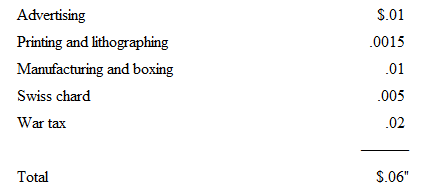
"Sure I know," Morris agreed, "but the art about taxing cigars ain't so much to sting the feller that manufactures them and the feller that buys them as the fellers which accepts them free for nothing. There is a whole lot of women's-wear retailers in the Middle West which has got quite a reputation for hospitality, because whenever they have a poker game up to the house they hand out cigars which cost you and me and other garment manufacturers here in New York as much as ninety dollars a thousand wholesale. So what I say is that the government should tax anybody which accepts a cigar to smoke on the spot ten cents, and for every one of them put-it-in-your-pocket-and-smoke-it-after-a-while cigars, such a feller should be taxed ten dollars or ten days."
"Well, they'll get a whole lot of money raising postage from two to three cents," Abe suggested.
"But not so much as they could get if they was to go about it right," Morris said. "For sending letters which says, 'Inclosed please find check in payment of your last month's bill and oblige,' three cents is enough for any business man to pay, Abe, and in fact the feller which received such a letter shouldn't ought to kick if the Post Office Department makes him pay also three cents postage, but there is some letters which it should ought to be the law that when a merchant received one of them he should right away report the sender to the Post Office Department for a special war-tax stamp of from one to a hundred dollars. For instance, two dollars extra wouldn't be too much postage for a letter where it says, 'Your favor received and contents noted, and in reply would say you should be so kind and wait a couple days and I would see what I could do toward sending you a check for your March bill, as my wife has been sick ever since May fifteenth, and oblige, yours truly, The Reliance Store, M. Doober, proprietor.'"
"If all them overdue retailers which is all the time pulling a sick wife on their creditors was to be taxed two dollars apiece, Mawruss," Abe said, "how much postage do you figure a storekeeper should pay when he writes to claim a shortage in delivery before he starts to unpack the goods, even. Then there is the feller which, when it don't get below zero promptly on the first of November, writes to tell you that he must say he is surprised, as the winter-weight garments which you shipped him ain't nowheres up to sample and is holding same at your disposal and remain, which if the government would come down on him for a hundred dollars, he is practically getting off with a warning. And I could think of a lot of other excess-postage cases, too, but, as I understand it, we are only trying to raise forty billion dollars, Mawruss."
"Don't let that stop you, Abe," Morris said, "because there's going to be plenty of extras over and above the original estimate, which I see that a lot of South American countries is coming into the war and it's only a question of a month or so when we would have calling on us a commission from Peru, a commission from Chile, a commission from Bolivia, a commission from Paraguay, and all of them with the same hard-luck story, that if they only had a couple of billion dollars they could put an army of five hundred thousand soldiers into the field, if they only had five hundred thousand soldiers."
"Just the same, Mawruss," Abe said, "them countries is going to be a lot of help."
"And when we get through paying the help, y'understand, we've still got to raise money for the family to live on," Morris said, "so go ahead with your suggestion, Abe. Maybe there's some taxes which Congress 'ain't thought of yet."
"Well, there's this here free speech, which, instead of being free, Mawruss, if it was subject to a tax of one dollar per soap-box hour, payable strictly in advance, y'understand, so far as the pacifists is concerned, you would be able to hear a pin drop. Even Congressmen would soon get tired of paying from twenty to twenty-four dollars a day, especially if the government made it a stamp tax."
"LaFollette would be covered mit stamps from head to foot," Morris remarked.
"That would suit me all right," Abe said, "particularly if the collector of internal revenue was to run him with stamps affixed through a cancellation-machine and cancel him good and proper."
IV
POTASH AND PERLMUTTER ON BERNSTORFF'S EXPENSE ACCOUNT
Here he is coming back from his trip after losing his whole territory to his firm's competitors, and naturally he tries to make a good showing with his expense account.
"I see where the government puts a limit on the price which coal-dealers could charge for coal," Abe Potash said to his partner, Morris Perlmutter.
"Sure, I know," Morris said, "but did the coal-dealers see it, because I met Felix Geigermann on the Subway this morning, and from the way he talked about what the coal-dealers was asking for coal up in Sand Plains, where he lives, Abe, I gathered it was somewheres around twenty dollars a caret unset."
"Gott sei dank I am living in an apartment mit steam heat and my lease has still got two years to run at the same rent," Abe said.
"Well, I hope it's written on good thick paper, and then it'll come in handy to wear under your overcoat when you sit home evenings next winter, Abe, because by the first of next February janitors will be giving coal to the furnace like it would be asperin – from five to ten grains every three hours," Morris predicted, "which I will admit that I ain't a good enough judge of anthracite coal to tell whether it's fireproof, of slow-burning construction, or just the ordinary sprinkled risk, y'understand, but I do know coal-dealers, Abe, and if the government says they must got to sell coal at seven dollars a ton, y'understand, it'll be like buying one of them high-grade automobiles where the list price includes only the engine and the two front wheels, F.O.B. Detroit. In other words, Abe, if you would buy coal to-day at seven dollars a ton you would get a bill something like this:
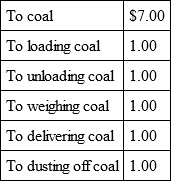
and you would be playing in luck if you didn't get charged a dollar each for tasting coal, smelling coal, feeling coal, and doing anything else to coal that a coal-dealer would have the nerve to charge one dollar for."
"Well, if I would be the United States government," Abe commented, "and had got a practical coal-man like this here Garfield to set a limit of seven dollars I wouldn't let them robbers pull no last rounds of rang-doodles on me, Mawruss. I'd take away their chips from 'em and put 'em right out of the game."
"Sure I know, Abe," Morris said, "aber this here Garfield ain't a practical coal-man, Abe, and maybe that's the trouble. Mr. Garfield is president of Williams College, so you couldn't blame these here coal-dealers, because you know as well as I do, Abe, the garment trade will certainly put up an awful holler if when it comes to appoint a cloak-and-suit administrator Mr. Wilson is going to wish on us some such expert as Nicholas Murray Butler oder the president of the Union Theological Cemetery."
"At that," Abe said, "I think they'd know more about the price of garments than Bernstorff did about the price of Congressmen. I always give that feller credit for more sense than that he should try to explain an item in his expense account by claiming that
April 3, 1917, To sundries $50,000
was what he paid for bribing the United States Congress."
"Well, say!" Morris exclaimed. "The poor feller had to tell 'em something, didn't he? Here he is coming back from his trip after losing his whole territory to his firm's competitors, and naturally he tries to make a good showing with his expense account, which, believe me, Abe, if I was a rotten salesman like that, before I would face my employer – and such an employer, because that Rosher 'ain't got them spike-end mustaches for nothing, Abe – I would first jump in the river, even if my expense account showed that I had been staying in a-dollar-and-a-half-a-day American-plan hotels and had sat up nights in the smoker for big jumps like from Terre Haute to Paducah."
"Can you imagine the way the Kaiser feels?" Abe said. "I suppose at the start he was keeping so calm that he bit the end off his fountain pen and started to light the cap, and probably took one or two puffs before he noticed anything strange about the flavor, because you could easy make a mistake like that with a German cigar.
"'Nu, Bernstorff,' he says, at last, as he looks at the expense account, 'before we take up the matter of this here eight-foot shelf of the world's greatest fiction I would like to hear what you got to say for yourself, so go ahead mit your lies and make it short.'
"'I suppose you got my letters,' Bernstorff begins, 'the ones I sent you through the Swede.'
"'What Swede?' the Kaiser says.
"'Yon Yonson, the second assistant ambassador,' Bernstorff answers. 'I told him if he got them letters through for me that you would give him an order on the Chancellor for a first-class red eagle, but I guess he'd be satisfied with one of them old-rose eagles, Class Four B, that we used to have piled up there in the corner of the shipping-room.'
"'I wouldn't even give him an order on Mike, the Popular Berlin Hatter, for a two-dollar derby, even,' the Kaiser says. 'Chutzpah! Writes me letter after letter with nothing but weather reports in 'em, and he wants me I should give this here Yonson a red eagle yet which costs me thirty-two fifty a dozen wholesale. Seemingly to you, Bernstorff, money is nothing.'
"Here the old man grabs ahold of the expense account again.
"'Honestly, Bernstorff,' he says, 'I don't see how you had the heart to spend all that money when you know how things are here in Berlin. If me and my Gussie sits down once a week to such a piece of meat as gedampfte Brustdeckel mit Kartoffelpfannkuchen, y'understand, that's already a feast for us, and as for chicken, I assure you we 'ain't had so much as a soup fowl in the house since my birthday a year ago, and you got the nerve to send me in an expense account like this. Aint it a shame and a disgrace?

and every other day for week after week you spent on Bolo anywheres from one to fifteen dollars. Tell me, Bernstorff, how could a man make such a god out of his stomach?'
"'Why, what do you think Bolo is?' Bernstorff asks.
"'I don't think what Bolo is; I know what Bolo is,' the Kaiser tells him, and a dreamy look comes into his eyes. 'Many a time I seen my poor Grossmutter olav hasholom make it. She used to chop up ten onions, five cents' worth parsley, and a big piece Knoblauch, add six eggs and a half a pound melted butter, and let simmer slowly. Now take your chicken and – '
"'All right, Boss, I wouldn't argue with you,' Bernstorff says, 'because them amounts represent only the preliminary lunches which I give this here Bolo. Further down you would see where he gets the real big money, and then I'll explain.'
"'Well, explain this,' the old man says. 'Here under date July second, nineteen sixteen, it stand an item:
To blowing up munitions plant $10,000
Who did you get to do it? Caruso?'
"'You couldn't blow up a munitions plant and make a first-class job of it under ten thousand dollars, Boss,' Bernstorff says.
"'Is that so?' the Kaiser tells him. 'Well, let me tell you something, Bernstorff. I've got a pretty good line on what them munitions explosions ought to cost. My eldest boy has been blowing up buildings in France for over three years now, and for what it costs to blow up a factory he could blow up two cathedrals and a château.'
"'Have it your own way, Boss,' Bernstorff says, 'but them château buildings is so old that they're pretty near falling down, anyway.'
"'Don't give me no arguments,' the Kaiser says. 'I suppose you're going to tell me these here
8 5-12 doz asstd bombs $3,200
was some Saturday specials you picked up in a bargain basement. What was they filled with, rubies?'
"'Bombs is awful high, Boss,' Bernstorff says. 'Ask Dernburg what he used to pay for bombs; ask Von Papen; ask this here judge of the New York Supreme Court – I forget his name; ask anybody; they would tell you the same.'
"'Should I also ask 'em if spies gets paid in America the same like stomach specialists in Germany? Look at this:
To one week's salary 12,235 spies $1,223,500
What have you been doing, Bernstorff? Keeping a steam-yacht on me and charging it up as spies?'
"'Listen, Boss,' Bernstorff says. 'If you would know what an awful strong organization spies has got in the United States, instead you would be talking to me this way you would be thanking your lucky stars that I didn't let 'em run the wage scale up on me no higher than they did. Why, before I left Washington a deputation from Local Number One Amalgamated Spies of North America comes to see me and – '
"'What the devil you are talking nonsense?' the Kaiser shouts. 'Moost you got to employ union spies? Couldn't you find thousands and thousands of non-union spies to work for you?'
"'That only goes to show what you know about America,' Bernstorff says. 'There's a whole lot of people in America which would stand for blowing up factories, sinking passenger-steamers, shooting up hospitals, and dropping bombs on kindergartens, y'understand, but when it comes to people employing scab labor, they draw the line. And then again, Boss, spies is very highly thought of in America. Respectable people, like lawyers and doctors, gets arrested every day over there, and even once in a while a minister, y'understand, but a spy —never!'
"At this point when it looks like plain sailing for Bernstorff, the Kaiser picks out that fifty-thousand-dollar item, and right there Bernstorff makes his big mistake, for as soon as he starts that Congressmen story the old man begins to figure that if Congressmen are so cheap and spies so dear, y'understand, the only thing to do is to call up the Polizeiprasidium and tell 'em to send around a plain-clothes man right away to number Twenty-six A Schloss Platz, ring Hohenzollern's bell."
"Then you really think that Bernstorff and Von Papen and all them crooks didn't spend the money over here that they claimed they spent," Morris said.
"They probably spent it, all right," Abe replied, "but whether or not they spent it for what they claimed they spent it for, Mawruss, that I don't know, because if them fellers didn't stop at arson, dynamiting, and murder, why should they hesitate at petty larceny?"
"But what them boys did in the way of blowing up munitions plants and sinking passenger-steamers was because they loved the Kaiser so much, and instead of arresting Bernstorff for the money he spent, Abe, I bet yer the Kaiser made him a thirty-second degree passed assistant Geheimrat or something," Morris declared.
"Well, there's no accounting for tastes, Mawruss," Abe said, "and if these here Germans is willing to slaughter, rob, and burn because they are in love with a feller which to me has a personality as attractive as the framed insides of the entrance to a safe deposit vault, y'understand, all I can say is that I don't give them no more credit for it than I would to a bookkeeper who committed forgery because he was in love with the third lady from the end in the second row of the original Bowery Burlesquers."
"The wonder to me is that the Kaiser don't see it that way, too," Morris commented.


